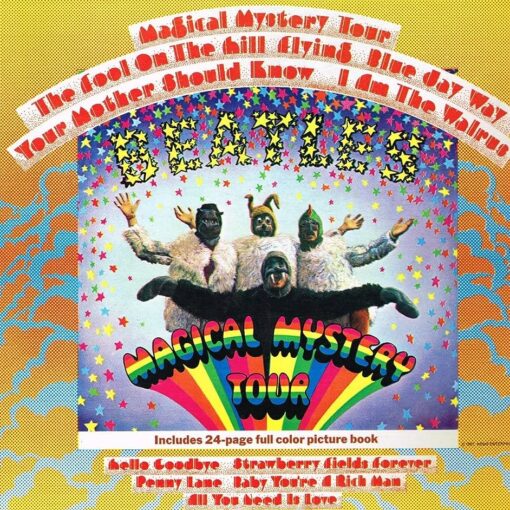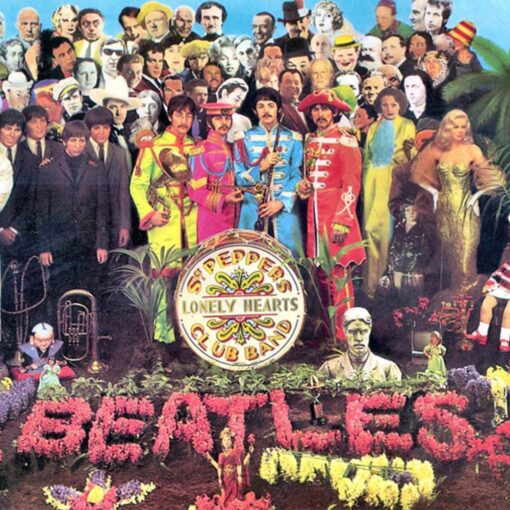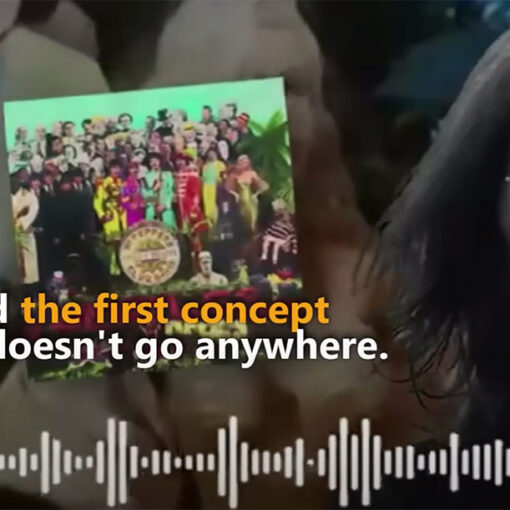- Published in 1967
- Author: Harrison
- Track 8 on “Sgt. Pepper’s Lonely Hearts Club Band“
Beatles quotes about “Within You Without You”
GEORGE 1967: “I’m writing more songs now that we’re not touring. The words are always a bit of a hangup for me. I’m not very poetic. ‘Within You Without You’ was written after dinner one night at Klaus Voorman’s house. He had a harmonium, which I hadn’t played before. I was doodling on it when the tune started to come. The first sentence came out of what we’d been doing that evening… ‘We were talking.’ That’s as far as I got that night. I finished the rest of the words later at home.”
JOHN 1967: “George has done a great indian one. We came along one night and he had about 400 indian fellas playing, and it was a great swinging event, as they say.”
JOHN 1980: “One of George’s best songs. One of my favorites of his, too. He’s clear on that song. His mind and his music are clear. There is his innate talent. He brought that sound together.”
About “Within You Without You”
“Within You Without You“, written by George Harrison, was his second Indian classical composition after after “Love You To“. The song was inspired by his visit to India in late 1966 with his mentor and sitar teacher Ravi Shankar. It was recorded in London without the other Beatles and features Indian instruments such as sitar, tambura, dilruba, and tabla. Harrison and members of the Asian Music Circle performed it. Musically, it evokes Indian devotional traditions, while the overtly spiritual lyrics reflect Harrison’s studies of Hindu philosophy and Vedic teachings.
The song was Harrison’s only contribution to Sgt. Pepper, although yogis such as Paramahansa Yogananda were featured on the album’s cover as a sign of his endorsement of Indian culture. Due to the success of the album, Indian classical music was introduced to a new audience in the West, contributing to the genre’s international popularity peak. During the Summer of Love, many of Harrison’s peers expressed utopian idealism influenced by “Within You Without You“.
Some music critics find the song lacklustre and pretentious, while others admire its musical authenticity and consider its message to be the most meaningful on Sgt. Pepper. According to David Fricke writing for Rolling Stone, the track is at once beautiful and severe, a magnetic sermon about materialism and communal responsibility amid a gentle Technicolor anarchy record.
As part of the Beatles’ 2006 remix album Love, the song was mixed with the John Lennon-penned “Tomorrow Never Knows“, creating what some reviewers consider to be the project’s most successful mashup. “Within You Without You” has been covered by Sonic Youth, Rainer Ptacek, Oasis, Patti Smith, Cheap Trick, and the Flaming Lips.
Meaning of “Within You Without You”
The lyrics of “Within You Without You” are deeply philosophical and spiritual. The song reflects George Harrison’s interest in Eastern spirituality and his experiences with Indian philosophy and meditation. It explores themes of inner reflection, the interconnectedness of all living beings, and the transient nature of material possessions.
The title itself, “Within You Without You,” suggests a contemplation of the duality of existence: the inner world of consciousness and the outer world of tangible reality. The song encourages listeners to look beyond surface appearances and seek a deeper understanding of the self and the universe.
In summary, “Within You Without You” is a meditative and introspective song that encourages contemplation of the nature of reality, the self, and the interconnectedness of all things. It reflects George Harrison’s spiritual journey and his quest for deeper meaning and understanding in life.
Personnel
- George Harrison – lead vocals, tambura, sitar, swarmandal, acoustic guitar
- Anna Joshi – dilruba
- Amrit Gajjar – dilruba
- Natwar Soni – tabla
- Buddhadev Kansara – tambura
- Neil Aspinall – tambura
- Erich Gruenberg, Alan Loveday, Julien Gaillard, Paul Scherman, Ralph Elman, David Wolfsthal, Jack Rothstein, Jack Greene – violins
- Reginald Kilbey, Allen Ford, Peter Beavan – cellos


